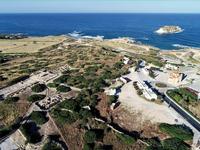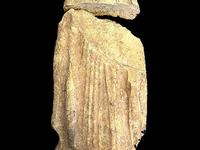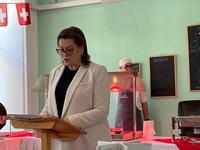Press Releases
23-10-2023 11:44
Address by the Deputy Minister of Culture, Dr Vasiliki Kassianidou, at the opening of the event “Era Chair ‘Mnemosyne’ Summer School 2023”
“Era Chair ‘Mnemosyne’ Summer School 2023 - Re-Envisioning Cultural Heritage Documentation in the Metaverse Age”
Dear distinguished guests, ladies and gentlemen,
It is my great pleasure to inaugurate today this training event on re-envisioning cultural heritage documentation in the metaverse era, which focuses on training scholars, stakeholders and more generally professionals in 2D and 3D digital documentation of tangible cultural heritage.
Please allow me to convey to all President Christodoulides’ congratulations for the organisation of the event and warm wishes for every success. I would also like to congratulate the organisers of the event at the Cyprus University of Technology and specifically the scholars and researchers of the Digital Heritage Research Laboratory, the UNESCO Chair on Digital Cultural Heritage, and the EU ERA Chair on Digital Cultural Heritage.
It is our mutual responsibility to preserve, sustain and safeguard cultural heritage for posterity and protect it from the numerous factors that place it under threat, namely natural disasters, climate change and other human actions such as armed conflict. It is now more pertinent than ever to act fast and effectively.
Digital documentation is a vital solution, providing accuracy for the conservation, restoration and management of cultural heritage. It allows the creation of digital material that can be handled simultaneously by various cultural heritage professionals, recording all physical characteristics and features.
Technological developments in 2D and 3D documentation have been extremely beneficial for cultural heritage documentation, preservation, restauration and management. The wealthy agenda of this school is indicative of the transversal role of digital culture for sustainable development methods to protect universal cultural heritage via science, technology and innovation.
The Deputy Ministry of Culture of the Republic of Cyprus applauds initiatives such as this for knowledge exchange and the development of best practices for the full digital documentation and digitisation of the tangible cultural heritage of Cyprus. In my role as the Deputy Minister of Culture, but also as an archaeologist and an academic, I would like to underline the significance of digital documentation and archiving for safeguarding and preserving cultural heritage.
Our digitisation efforts are mostly focused on projects run by the Department of Antiquities, which is now a part of the Deputy Ministry of Culture. The projects are often long-term and funded by national, european and international funds. They are often done in collaboration with other local stakeholders, universities and research centres.
As there is not much time in this short address to present all of these projects, I have picked out some of the most important ones. One of the long-standing projects of the Department of Antiquities has been the digitisation of the photographic archive and the drawings from past excavations and the “Cyprus Archaeological Digitisation Programme”, or CADiP for short, which is a European programme co-financed by the Norwegian Financial Mechanism and the Republic of Cyprus.
The digitisation of the movable antiquities is a particularly significant tool in our constant fight against the illicit trafficking of cultural goods. With this goal in mind, the project entitled “Digitising the Museums of Cyprus” was launched in 2021. In the framework of this project, eight archaeologists have been employed for a period of 31 months to digitise 96,000 movable antiquities located in state museums across Cyprus. Another project which has just been concluded, called “Cyprus Coastal Assessment Project”, is aimed at the mapping and documentation of the underwater and coastal archaeological sites of Cyprus.
I should also mention the recently concluded DigiArc project, in collaboration with the Cyprus Technological University, executed for the documentation of selected medieval fortifications and castles in Cyprus and their surroundings, using terrestrial and aerial digital technologies for the production of 3D point-clouds.
Digital technologies play a significant role in effective public awareness and engagement with cultural heritage, complementing our efforts for transforming Cyprus into a destination for cultural tourism; addressing visitors’ essential motivation to learn, discover, and experience the tangible and intangible cultural heritage of our island. We have begun realising this initiative with the development of content for audio guides, tablets, mobile applications and info-kiosks that is available in several languages.
Τhe digital documentation of cultural heritage, and particularly of material culture, is becoming vital for its protection, preservation, reconstruction and rehabilitation, especially in cases of natural or anthropogenic destructions and hazards, whether these might be physical decay, illicit trafficking, urban development, climate change and so on.
Especially in the case of Cyprus, the digitisation of material culture is considered a high necessity for the repatriation of illicitly trafficked artefacts removed from their cultural contexts after the 1974 Turkish invasion, and for monitoring and managing thousands of artefacts dispersed abroad as a consequence of the 19th century legislation on the export of antiquities.
The Deputy Ministry’s digitisation efforts continue in areas of contemporary culture and modern art and it is my personal ambition that the Deputy Ministry eventually aligns completely with the objectives and milestones set by the European Commission’s Digital Europe programme and cultural heritage policies.
Concluding this address, allow me to wish you every success and may this event offer the groundwork for more collaborations and initiatives in the field of cultural heritage.
Thank you.
(EFys/AP/Echr)
Relevant Press Releases



22-11-2024 11:25
The “Royal Chapel” of Agia Aikaterini at Pyrga closed for the public

.jpg)
.jpg)
.jpg)



